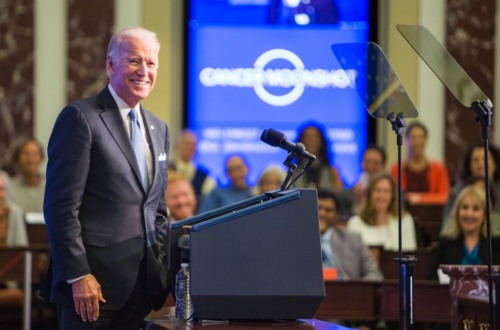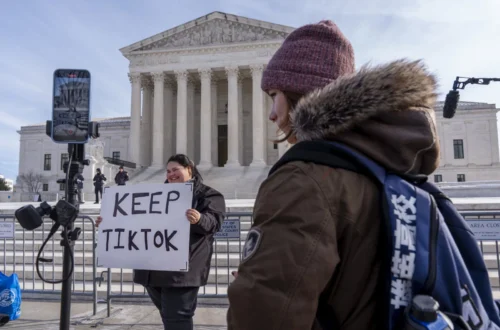To confront a supposed ‘Big-Tech-turned-Big-Brother,’ Gov. Ron DeSantis announced his and House Republicans’ plan to introduce the Transparency in Technology Act in a Feb. 2 conference.
The move could cost Florida billions of dollars made from Big Tech companies, as the state earned $3.1 billion alone last year from companies such as Amazon, Apple, Google, Facebook and Twitter.
What is the Transparency in Technology Act?
The Transparency in Technology Act proposed by DeSantis and Florida House Republicans offer protections to both average social media users and politicians in addition to promoting accountability of technology companies. The proposed legislation will aim to:
- Push companies to publish their community standards on banning posts and users.
- Enable equal access for news organizations and qualified political candidates to users without interference from algorithms.
- Cease arbitrary bans of platform users.
- Allow users the opportunity to opt-out of algorithms.
- Establish clear communication and consent of users before companies can frequently change their terms of use.
If passed, the legislation will enact stringent penalties for companies that violate the Transparency in Technology Act. These fines could be placed in the event of a social media company de-platforming a candidate for elected office or favoring a certain candidate for office.
“Under our proposal, if a technology company de-platforms a candidate for elected office in Florida during an election, that company will face a daily fine of $100,000 until the candidate’s access to the platform is restored,” stated DeSantis.
Why is the Transparency in Technology Act being created?
At the Feb. 2 conference, DeSantis discussed the introduction of the Transparency in Technology Act, explicitly citing the removal of the Parler app from Apple and Google app stores and the permanent ban of former President Donald Trump on various social media platforms as the main motivation behind the bill proposal.
“You can look no further than the last several months of the election as coordinated, calculated efforts were undertaken to advance an increasingly evident political agenda of the Big Tech companies, ” said DeSantis.
Following the Jan. 6 Capitol riots, most notably, Twitter announced two days later that Trump’s account, which boasted nearly 90 million followers prior to the Capitol riots, would be permanently suspended. In the Jan. 8 announcement, Twitter cited numerous tweets that broke the social media platform’s terms of use for “the risk of further incitement of violence.”
Recently, Twitter’s chief financial officer, Ned Segal, reinforced the permanence of the suspension in regards to the possibility of another bid from Trump for the presidency. Segal stated, “The way our policies work, when you’re removed from the platform, you’re removed from the platform…whether you’re a commentator, you’re a CFO, or you are a former or current public official. Remember, our policies are designed to make sure that people are not inciting violence, and if anybody does that, we have to remove them from the service, and our policies don’t allow people to come back.”
A new NYU study has recently disputed DeSantis’s claims of social media companies targeting conservative voices, pointing to right-leaning pages dominating engagement on Facebook and seemingly balanced views and hours watched on YouTube. Additionally, the study called upon President Joe Biden’s administration to update Section 230 to provide “leverage to persuade platforms to accept a range of new responsibilities related to policing content” and a new Digital Regulatory Agency.
Is the Transparency in Technology Act constitutional?
In the wake of DeSantis’s announcement about the Transparency in Technology Act, many have called into question the constitutionality of the legislation, such as technology attorney and president of Washington, D.C.-based thinktank TechFreedom, Berin Szóka. Specifically, Szóka has cited the 1974 Miami Herald Publishing Co. vs Tornillo Supreme Court decision as evidence that DeSantis’s legislation is unconstitutional.
The Miami Herald Publishing Co. vs Tornillo case unanimously struck down a 1913 law that granted political candidates the ‘right to reply’ who had been attacked on the basis of personal character or official record by newspaper outlets. Prior to the Supreme Court case, political candidates were able to demand that the newspaper print their response free of charge to address editorial criticisms. Szóka has called the Transparency in Technology Act a “reboot” of this 1913 law.
“Newspapers can’t be forced to carry speech they don’t like, and websites have the same rights as newspapers,” Szóka stated.
However, others such as former director of Florida’s Consumer Protection Division Richard Lawson have pointed to some credibility within the legislation, although he admittedly noted that the constitutionality of the legislation will be difficult to interpret until a draft copy is introduced.
Lawson said, “If the [tech company’s] terms of service says ‘we will remove you because of X reason,’ and you’re removing some people for X reason but you’re letting other people stay up for X reason, then any user — not just the people who got removed, but any user — would have a claim on the basis that they were deceived.”
How will the Transparency in Technology Act affect Florida’s technology sector?
With the looming possibility of the Transparency in Technology Act being enacted, many Floridians are wondering how the legislation will affect Florida’s technology sector, which has been rapidly growing the past few years.
Employment in Florida’s technology sector has increased by 18,000 jobs in 2019 and accounts for 6.2% of the state workforce. Moreover, Florida was nationally ranked fourth in net technology employment and third in total tech employment growth in 2019.
Furthermore, the legislation may pose a significant threat to cities such as Orlando and Tampa, which have both grown exponentially within the tech scene. Companies such as SpaceX, Electronic Arts, and Lockheed Martin have previously tapped into Orlando’s employment, contributing to the 2019 Orlando technology sector’s 37,500 jobs. Tampa has ranked as Florida’s top tech-market with over 50,000 jobs and as the 29th largest tech market in the country.
Although not all tech companies may face enormous repercussions as a result of the Transparency in Technology Act, many may face difficult decisions about the operation of their company and how to form their terms of use in accordance with the legislation. For some companies, that may mean forfeiting their First Amendment right.
“The law violates the First Amendment, and there’s no way they could enforce it. It’s not even close,” asserted Florida International University law professor Howard Wasserman. “Twitter and Facebook and all these are private. They have a right to decide who gets on and off their platform.”
Featured image: Gov. Ron DeSantis speaking at 2018 Student Action Summit hosted by Turning Point USA. Unmodified photo by Gage Skidmore used under a Creative Commons license. (http://bit.ly/30w8vbA)
Check out other recent articles from the Florida Political Review here.





